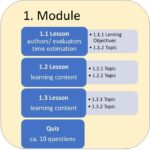
During the past two years, we have encountered the hardest period of humankind. The disastrous impact was caused by the outbreak of covid-19 pandemic, which pushed ourselves to extreme limits in terms of persistence, leadership and organizational management in the middle of a far-reaching, unpredictable future.
Having said that, it is the universities that play an important role in the development of society. The main responsibilities include: training the world’ future leaders. And those responsibilities are connected with certain objectives: constructing governmental systems that can quickly adapt and effectively tackle the challenges like pandemics, trading wars,….., promoting sustainable economic development, supporting the balance between freedom, equality and justice throughout the world, and combating climate change.
For the time being, a significant change has been witnessed in the field of education, which was the result of worldwide globalization, transformation of modern technology and society. As a result, there is an obvious adjustment to the biggest changes, where virtual interaction and online training have become increasingly popular. In fact, if it weren’t for the pandemic, the changes in education wouldn’t happen so fast.
Accordingly, the transformation is believed to be a positive trend for some reasons.
- The future of education, and also of work will be a whole lot different.

What the future holds for education is blended. Offline classrooms will be supplemented with various educational resources, in support of greater adaptability and suitability to the learner’s needs and situations. The different scenarios of the learning environment result in a positive effect on the development of an individual with regards to the aspect of becoming a global citizen and sharpening their skills as an outstanding employee.
In contrast to the notions that robots would replace human beings, curfews and other restrictions during the pandemic would not limit or threaten us at all. Instead, advanced technology has brought us closer and closer and enabled us to push beyond limits and achieved bigger success in group working, virtual meetings and providing efficient educational programs.
Therefore, after the pandemic, the world has proved to be better at adapting to the culture of new normal and being accustomed to the enormous changes.
For example, teachers will have live lessons and the working or learning environment will become more flexible and blended. In other scenarios, teachers will work with their counterparts via social platforms, even at home or at their workplaces in negligence of the distance, and still ensuring productivity. In other words, they can also work with their colleagues from many different places and time zones, cooperate with all walks of life and absorb various visions from many parts of the world.
Despite the fact that learners of all levels prefer to join a face-to-face class, the presence of online classes has proved to be effective and safe. One reason is that students can not go out during the social distance or go any further across the border to study; as a result, face-to-face classes are no longer available and meet the students’ demand. Another reason is that virtual classrooms offer more than that of the traditional ones. For example, online classes can offer better learning experiences by expanding and varying the range of teaching techniques as well as the resources.
The members of the faculty or academics would get to shoulder the responsibility for this transition, and especially those who are at a business school or educational organization. In order to succeed, the key factor does not depend on the education format itself or the content of the program, but it depends on the learners’ experiences governed by the instructors and coaches no matter what it is: close or distant.
2)Achieving the fairness between the inclusion and freedom of intellect.

We are now witnessing a plethora of changes in the educational field, which is happening because of the progressive adjustment in learning methods and abilities. Despite some of the limitations, there have been a lot of achievements to cherish and promote over the past few years.
It not only requires equality between the various groups in a university, including students, university faculty and management staff, but also the need to show mutual understanding and respect for others, especially with regards to sexes, gender orientation, ethnic groups, diverse culture, religion, nationality.
We have to bear in mind that all the universities have the same origin, and by which it means that the equal values should be shared and cherished by all. Therefore, this understanding will bring a variety of researching tools, experiment opportunities and rich learning experiences.
It is no exaggeration to say that welcoming diversity will become an indispensable part of our blended society, no matter what it takes to overcome limitations to university entrance, or visa restrictions and any other form of inequality, discrimination. There will always be a chance to delineate all of these bad things.
3) The importance of STEM and data sciences

Tertiary education follows a comprehensive approach to education for the younger generations of modern citizens. A more in-depth knowledge is required in order to provide professional knowledge, equip humans with critical thinking skills, and bonding us with others from various age-groups and cultures.
Simultaneously, upgrading digital skills and capabilities, data sciences and technology is required by headhunters and recruiters. This is because knowledge in these areas is absolutely necessary for the company and even start-up ones.
There is still a misunderstanding that revolves around the concept of humanities and STEM, which should have been eradicated by now.
This is clarified by the fact that both CEOs that have either of the degrees in the humanities or STEM could help the entrepreneurs to become successful in no time.
4) Lifelong pursuit of knowledge

This is an era of people who will have an extended life of working than any previous generations. Therefore, higher education will become significantly essential for all of those who take academic knowledge into serious consideration. To meet this demand, a major innovation in relation to formats, teaching methods, coaching, and a combination of health needs and personal preferences should be employed in the higher segment of education.
Obviously, education is the most attractive and challenging career. But maybe the dilemma of whether or not universities and colleges have the ability to change and cater to the needs and demands of studying in the new era, and whether the in-charge personnel will embrace the flexibility as well as the empowerment of students or not is still a controversial question.






![Erratum for “An inverse theorem for the Gowers U^s+1[N]-norm”](https://azmath.info/wp-content/uploads/2024/07/2211-erratum-for-an-inverse-theorem-for-the-gowers-us1n-norm-150x150.jpg)

